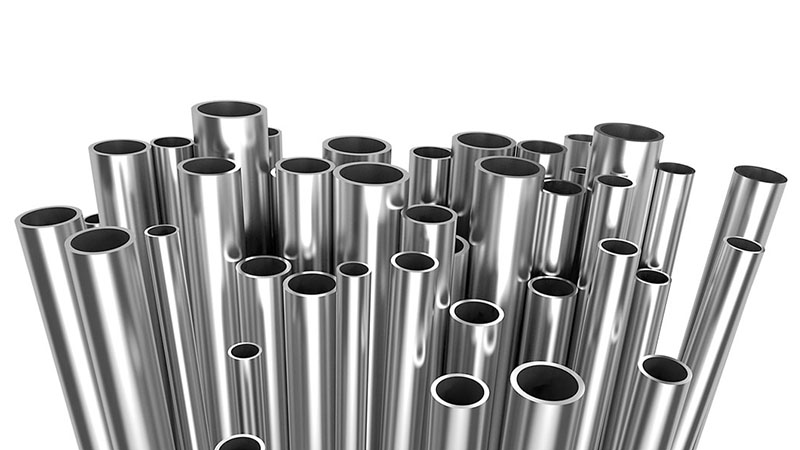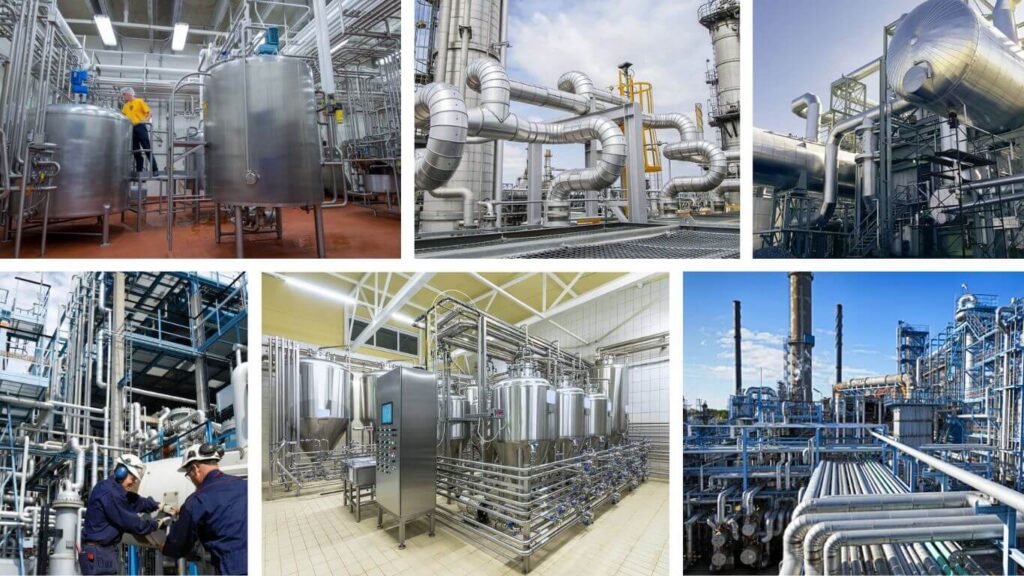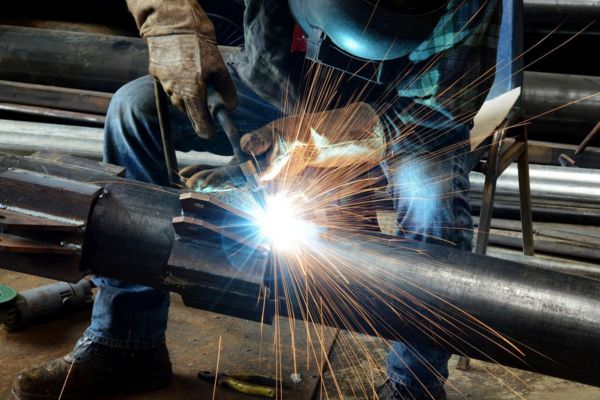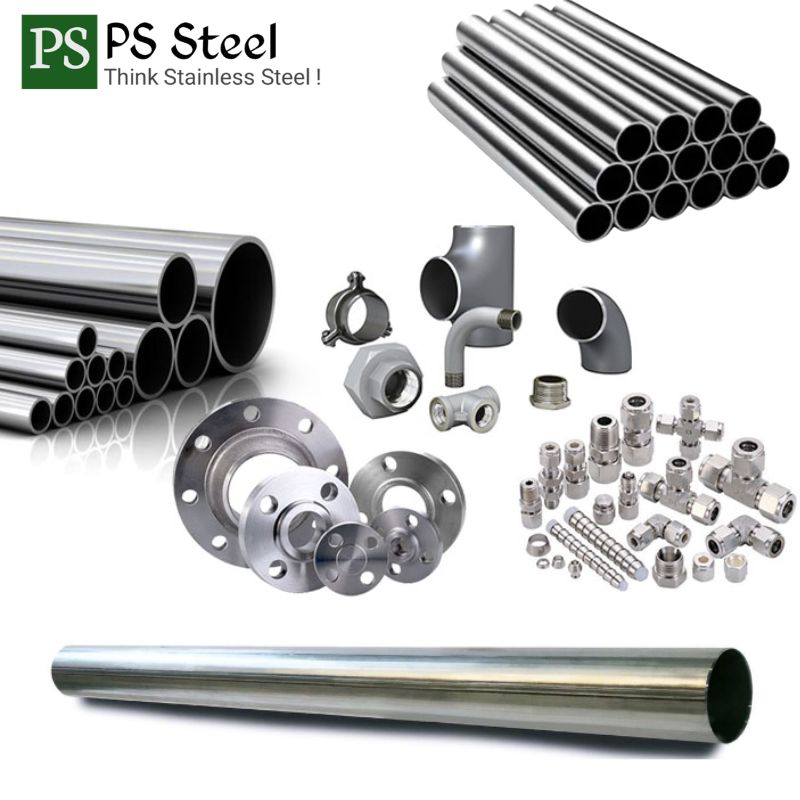Introduction

In power generation plants, safety and efficiency are crucial for ensuring reliable and continuous operation. The use of high-quality materials plays a key role in achieving these goals. Steel pipes, in particular, are vital due to their strength, durability, and resistance to various stresses. High-quality steel pipes help minimize risks and enhance the operational efficiency of power plants, making them indispensable in the industry.
Quality of Steel Pipes

The quality and durability of steel pipes play a crucial role in maintaining plant safety and efficiency. High-quality steel pipes are designed to resist corrosion, which is essential for their performance in various industrial environments. Corrosion can weaken pipes over time, leading to leaks or bursts. Therefore, using steel pipes with superior corrosion resistance helps in preventing potential hazards and ensuring a safer working environment.
Another important aspect is the ability of steel pipes to withstand high pressure. In many industrial applications, pipes are used to transport gases or liquids under high pressure. If the pipes fail to withstand this pressure, it could result in dangerous situations, including explosions or spills. High-pressure tolerance in steel pipes is vital for minimizing risks and maintaining smooth operations.
Longevity is also a key factor. Durable steel pipes require less frequent replacements and repairs, resulting in reduced downtime and maintenance costs. This contributes to better operational efficiency and reliability of the plant’s infrastructure. By selecting steel pipes known for their long lifespan, industries can ensure continuous and uninterrupted performance, which is crucial for productivity.
In summary, the quality and durability of steel pipes, characterized by resistance to corrosion, high-pressure tolerance, and longevity, are fundamental elements that influence the safety and efficiency of industrial plants.
Safety Standards and Compliance

Using steel pipes that comply with industry safety standards and regulations is crucial for several reasons. First, these standards ensure that the pipes are made with high-quality materials and manufacturing processes. This decreases the chances of failure, leaks, or other issues that could lead to hazardous situations. For industries like oil and gas, power generation, and water treatment, safety is paramount due to the high stakes involved.
Certifications play a critical role in this context. Certified pipes have been rigorously tested and meet specific guidelines set by industry authorities. This provides an additional layer of assurance that the pipes will perform reliably under various conditions. Adhering to safety protocols further strengthens this assurance, ensuring that the installation and use of these pipes are done correctly and safely.
In summary, following safety standards and obtaining certifications is not just a formality. It is a proactive step to safeguard both the people involved and the integrity of the operations in industries like petrochemical, pharmaceutical, and food & beverage. Always choosing steel pipes that meet these criteria can prevent accidents, enhance efficiency, and maintain a safe working environment.
Installation and Maintenance Efficiency

Efficient installation and regular maintenance of steel pipes play a crucial role in minimizing downtime and boosting operational efficiency in power generation plants. Using high-quality steel pipes ensures durability and reduces the need for frequent replacements. A well-executed installation by experienced professionals ensures that the system functions smoothly from the start, avoiding initial complications that could lead to outages.
Regular maintenance programs are essential to identify and address potential issues before they escalate into major problems. Scheduled inspections and timely repairs prevent unexpected failures, ensuring continuous operation. This proactive approach minimizes the risk of costly shutdowns and maintains the steady production of energy.
Monitoring the condition of steel pipes and promptly addressing corrosion, leaks, or blockages keep the system running efficiently. Using advanced techniques such as ultrasonic testing and internal pipe inspection tools allows for accurate assessment of pipe health without interrupting operations. These measures contribute to consistent performance and reliability, enhancing the overall efficiency of power generation plants.
Cost-Effectiveness:

Using high-quality steel pipes can offer significant cost benefits over time. The initial investment may be higher compared to lower-grade materials, but the long-term savings make it a wise choice. Reduced maintenance costs are one such benefit. High-quality steel pipes are more resistant to corrosion, wear, and tear. This resistance means fewer repairs and upkeep efforts, translating to lower ongoing expenses for maintenance crews and materials.
Another advantage is the decreased need for replacements. High-quality steel pipes have a longer lifespan than their cheaper counterparts. This durability reduces the frequency of needing to replace pipes, which can be costly and time-consuming. Fewer replacements mean that projects can continue with less interruption, and the focus can remain on production and other critical tasks.
Improved safety is also a crucial factor. High-quality steel pipes are less likely to fail under pressure or extreme conditions. This reliability reduces the risk of accidents and hazards, such as leaks or bursts, which can lead to expensive shutdowns, legal costs, and damage to surrounding equipment and environments. The safer the work environment, the less likely companies are to incur costs related to health and safety incidents.
In summary, while the upfront cost of high-quality steel pipes is higher, the ongoing savings from reduced maintenance, fewer replacements, and improved safety make them a cost-effective investment for industrial applications.
Case Studies and Real-World Examples
In the field of power generation, the focus on safety and efficiency is paramount. High-quality steel pipes have played a crucial role in improving these aspects in various power plants around the world. Below are some examples that highlight these improvements.
1. Thermal Power Plant in India
A thermal power plant in India faced challenges with frequent pipe failures due to high temperatures and pressure, causing downtime and maintenance issues. By switching to high-quality steel pipes, the plant observed not only longer pipe life but also reduced frequency of maintenance. The new pipes were more resistant to high temperatures and corrosion, enhancing the overall reliability of the plant.
2. Hydroelectric Plant in Canada
A hydroelectric power plant in Canada struggled with pipe corrosion and scaling, which affected the efficiency of water flow. The introduction of stainless steel pipes significantly reduced these issues. The stainless steel pipes provided better resistance to water-borne chemicals, leading to smoother operation and improved efficiency. This also lowered the maintenance costs and extended the lifespan of the piping system.
3. Biomass Power Plant in Germany
A biomass power plant in Germany sought to enhance its operational efficiency. The plant adopted high-grade stainless steel pipes, known for their heat resistance and durability. These pipes performed well under the plant’s demanding conditions, resulting in improved energy conversion efficiency and fewer emissions. By reducing the need for frequent replacements, the plant also saw a decrease in long-term operational costs.
These examples demonstrate how high-quality steel pipes can make a significant difference in the safety and efficiency of power generation plants. The choice of material plays a vital role in ensuring the smooth and secure operation of these facilities.
Conclusion
Investing in high-quality steel pipes is a critical decision for power generation plants focused on safety and operational efficiency. By choosing materials like those provided by PS Steel, businesses can ensure compliance with safety standards, reduce maintenance costs, and achieve long-term cost savings. For more information on high-quality SS pipes and fittings, visit PS Steel.